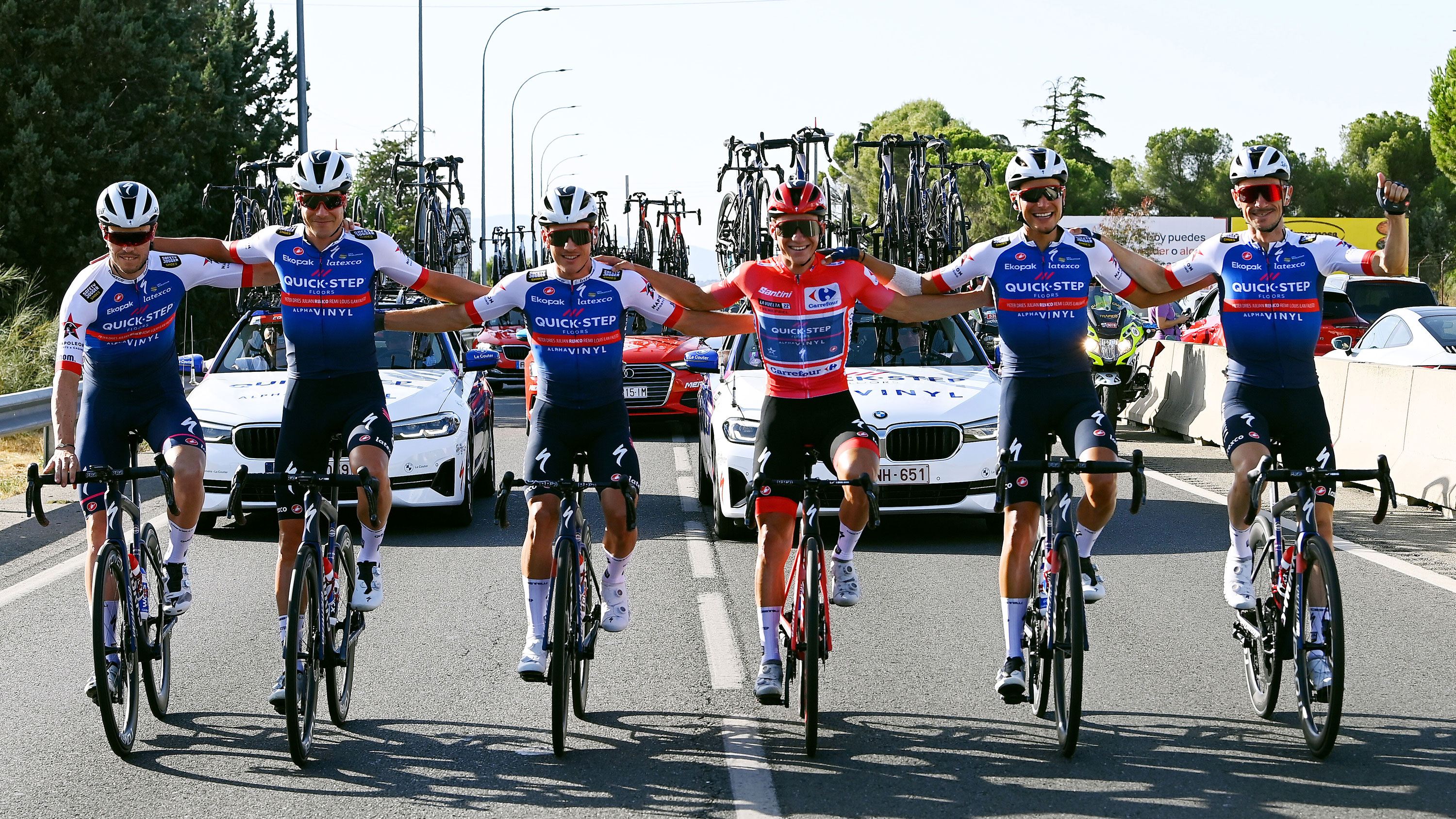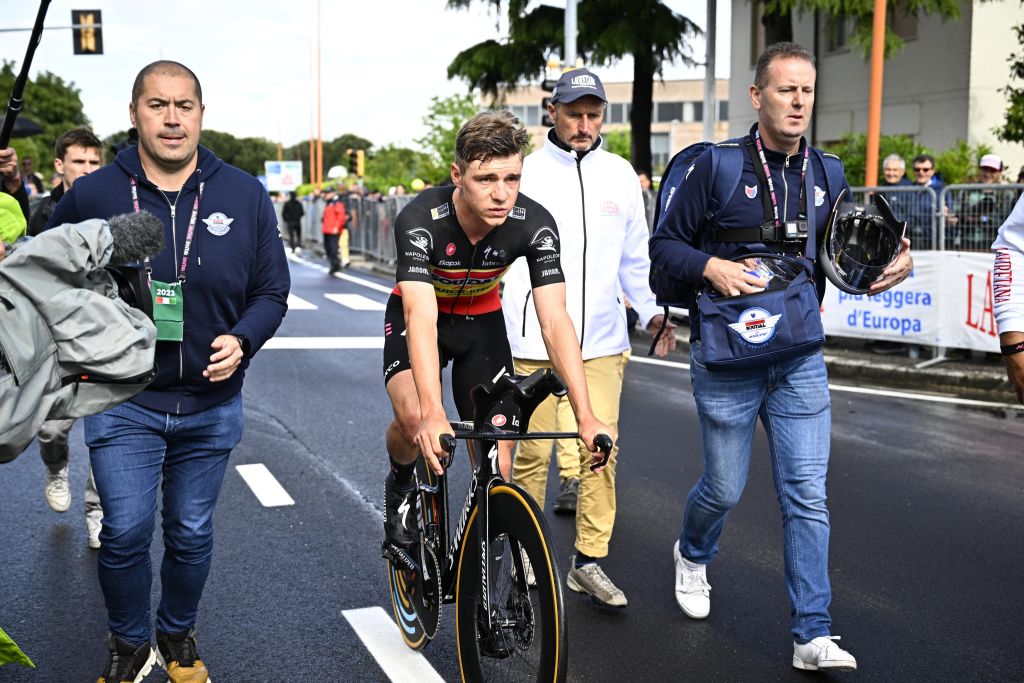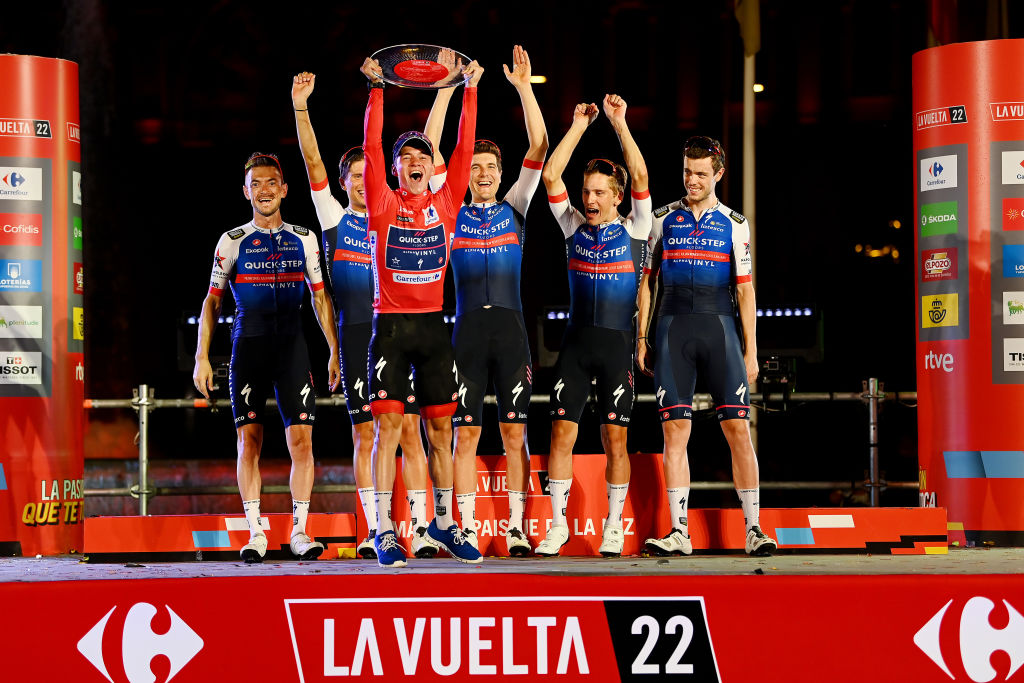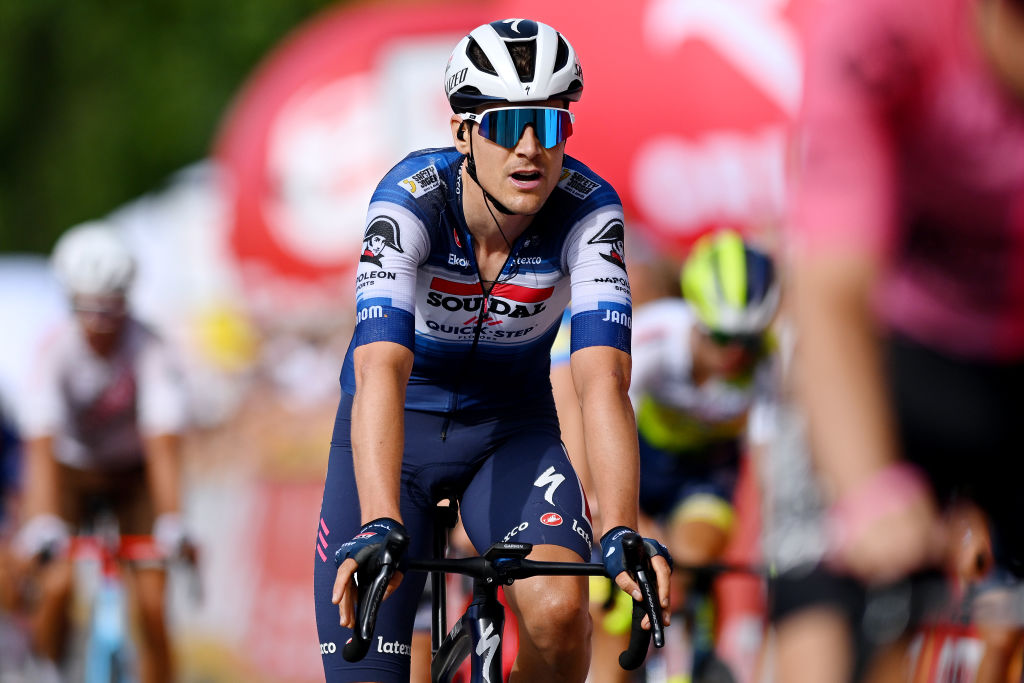
A little less than a year ago, in the QuickStep team bus at a Vuelta a España start, the usual techno music that been blasting out every morning for Remco Evenepoel and his teammates for three weeks was suddenly turned down.
“It was the day of the final mountain stage, and we did that because we were feeling so tense,” Louis Vervaeke says now. “We really realized how much we didn’t want to lose the leader’s jersey at the last moment.
“Up to then, we had been focusing on the day to day. But that morning, we got really worried we'd lose everything, just when the win was so close."
If the momentousness of the occasion all but got to Evenepoel, Vervaeke and the rest of the QuickStep squad on the morning of stage 20 of the 2022 Vuelta, it was only logical. Evenepoel was not just on the point of taking his biggest race to date, he was also within touching distance of ending a four-decades-and-counting drought for Belgium in the Grand Tours. In a country as obsessed with the sport, the sense of anticipation was massive.
But while the techno music stopped, the Remco beat went right on that day on the Vuelta, and all the way through to Madrid 24 hours later, and his landmark triumph.
Eleven months on, both Evenepoel and Vervaeke, one of his main support climbers at the 2022 Vuelta and the Giro in May, will be present again at the Vuelta start on Saturday in Barcelona. But as Vervaeke tells Cyclingnews, even if Remco´s place in history as the rider who ended Belgium's agonisingly long wait between Grand Tour wins is now set in stone, the pressure on the country's star rider to win in Spain again could be even higher than last September.
“On the one hand yes, it’s less stress, but on the other hand some of the Belgian media say we cannot lose,” Vervaeke points out.
“So it's always a two-edged question. The pressure’s less, but if Remco maybe finishes behind [Jonas] Vingegaard (Jumbo-Visma), or if he does a good Vuelta but doesn’t win, then for some media, it will have been a bad race.
“The Tour de France [next year] will be very different, even with Vingegaard. But I think people have to realise that if you can finish on the podium or take a top five in a Grand Tour, it’s also not a bad race, especially if you win some stages.”
Warming to his argument, Vervaeke points out that the original 2023 Remco masterplan was to do the Giro d'Italia and then the World Championships then pull down the curtain on the high-profile goals. "The Vuelta wasn't in the initial plan for the year. It's not easy to do the same preparation [for the Vuelta] because as a team, we invested a lot in the Giro. We did the perfect preparation for it,” Vervaeke says.
“We did San Juan and UAE and altitude camp for three weeks and we were really good in Catalunya, then we did more altitude, but never going too hard. You could see in Liège-Bastogne-Liège that we were ready for the Giro. We were even stronger than in last year’s Vuelta. But then there was the corona."
Evenepoel's untimely exit from the Giro with a positive for COVID-19 saw the work unravel. "After you did all these sacrifices, nearly 60 days at altitude, then it’s hard to do it all over again,” he says.
“I feel I’ll be ready for the Vuelta, I’ll be in shape. But [after the Giro] you feel it’s less natural, it’s asking more mentally to do it all over again.”

Bouncing back
While Evenepoel's performance at San Sebastián and the World Championships speak volumes about his current condition, among his support riders, it's not just Vervaeke who's on track, of course. In the summer, the whole Vuelta lineup for Soudal-QuickStep did another lengthy altitude training camp at Val di Fassa in Italy and then after the bulk of them raced in the Tour de Pologne, they returned to Italy for another ten-day block in the mountains.
Nor is Evenepoel the only rider who´s had to bounce back from a COVID positive in the Giro of course. More than half the team went down with the virus, including Vervaeke. "I was not as ill as Remco. I felt like my body was fighting something, but that was as far as it went. The first time I got COVID last year I was really sick, I had a really bad fever. This time maybe my body's more immune to it. Put it this way, l if I hadn't tested positive, I wouldn't have stopped," Vervaeke recalls.
“On the other hand, this year, I've had a lot of days living out of a suitcase. But at least in the second training camp, I could take my family this time, and I have to thank the team for allowing me that, that was really nice of them. I think I would have been close to cracking and not being mentally fresh for the Vuelta if I hadn't had my family with me.”
A top rider’s leadership qualities and true levels of ambition shine through as much in defeat as in victory. Vervaeke says that could not have become clearer to him than during and after the Giro d'Italia this May. Within days of his abandon, Evenepoel had already turned that defeat into another opportunity: to head back to the Vuelta in August.
The day the Evenepoel COVID bombshell dropped, Vervaeke says, “We could see from his face in the afternoon that he was not in a great place even if he’d won the TT and moved into the lead.
"And then in the evening, of course we got the news that he had corona so it was like - boom! But even that day, as a team we were really shocked, by his test but even on the rest day, he had us thinking about what we could do after he'd gone, motivating us to try and win a stage.
"It helped that we were all in really good shape because we’d sacrificed so much, trained so hard. Then five or six days after Remco got home, he called me and said ‘Hey, what do you think about the Vuelta?' He'd immediately started thinking about finding new goals and refocussing on new wins. That’s when you see what a big champion he really is, just how driven he is to win.
“He could also have said, you know, ‘I’m done with cycling for a while, after all I’d done to try and win in Italy.’ But instead he took one week off and then it was like he was refocused, saying: ‘Maybe we can do the Vuelta, maybe we can do it all over again.’”

The road ahead
So Soudal-QuickStep drew up a plan again for their second Grand Tour GC battle of 2023, and after all the training camps in Italy, they will head to the Vuelta as defending champions. Yet even if the pressure remains as high in some ways and the training program has been hard, mentally, to assimilate at times, Vervaeke says the knowledge that they have got through one Vuelta and come out as winners remains a huge source of inspiration.
"For sure, the line-up may be tougher than last year, even though we had some really major opponents in 2022. But for me the first Grand Tour victory will remain the hardest one to win, whatever happens, because last year of course we had a lower level of self-confidence and self-belief,” Vervaeke says.
"Last year, when you had a bad day, you doubted yourself more deeply, you thought maybe we can’t win a Grand Tour. But Remco had two bad days in the Vuelta last year after he crashed [in the second week - Ed.] and he remained committed to the fight.
"So if it happens again, he'll know this time it’s only a bad day and he can still get better in the third week. And knowing that can help you to go through to the end."
Yet if the knowledge that one win was achievable is a deep source of motivation, the awareness of how great the demands had been on the team workers in 2022 also drives him on in 2023, Vervaeke says.
"It helps me commit even more in training camps and nutrition wise, it helps me to be at my very, very best in a Grand Tour. Because I also felt last year that to win a Grand Tour as a domestique, the whole team had be super-strong: you could not go there at only 95 percent, it had to 100 percent."
As Vervaeke sees it, last year was a learning curve for Soudal-QuickStep, so this time round there will be a much deeper store of experience for riders like him doing the same job to draw on. “I was aware of it before, but now I realise it even more that you have to be careful not to use up too much energy when it's not necessary. And also, when you have the leader’s jersey, one of the most important moments of a stage is controlling the starts.
“If you have the start controlled really well, then you control the break and you control the race. You don’t have to waste energy chasing a break that could be dangerous. It’s a key point of the race, especially on stages like Sierra Nevada last year, if there’s a big name in the break and you haven’t got anybody up there. On days like that if you let the wrong guys go, you can lose the entire race at km 10 of a stage, or even km 0.”
For all that Evenepoel had categorically proved he was the strongest rider in what remained of the Vuelta peloton by the time it headed into Madrid, it had not been such an easy race for QuickStep. Primoz Roglic’s attempt to dislodge Evenepoel had only self-destructed when he crashed out at the start of the third week, Evenepoel had lost both Pieter Serry to sickness and Julian Alaphilippe to injuries, and Evenepoel himself crashed hard just before two critical mountain stages in the south.
“We had an amazing start, the team time trial went ok, we could have done better in my opinion, but then afterwards in the first stages we really dominated the race with Remco. We wanted to use the toughness of the course in the north to gain some time with him because we knew he was feeling good, and we played it perfectly.
“When we lost Serry [on stage 9 - Ed.] we didn’t panic too much because we still had quite a few riders to pull, but then when Julian dropped out [on stage 11] the stress levels were higher because there was only Ilan [Van Wilder] and me to support him in the mountains and that’s not so much when you have two weeks to go.”
Given their limited climbing firepower, Vervaeke and Soudal-QuickStep opted to think outside the box on the toughest mountain stages, and this willingness to use unconventional strategies to cover potential weaknesses is something that could be colossally useful again in the 2023 Vuelta. In 2022 on the toughest stage of the Vuelta at Sierra Nevada, for example, Soudal-QuickStep gambled on the idea that Jumbo-Visma would keep things under control in the peloton and opted to put Vervaeke in the break instead.
And it worked. “I’m a really good climber but I’m not one of the top 10 in the world,” Vervaeke explains. “So stages like this I can be good for support, I can pull in the lower parts of a final climb. but not much more than that.
“So on this stage which started with a really wild series of breakaway attempts, I figured a good way of surviving that first part of the Sierra Nevada climbs would be by getting in a break. Then afterwards being ahead I could stay up there and be useful for Remco on the easier part of Sierra Nevada towards the top, where it was only five or six percent, where I could draft for Remco. We made a good plan.”

In terms of how the 2022 Vuelta compared to the 2023 Giro, it's also been a learning curve. As Vervaeke says, “the Vuelta surprised me sometimes because it had some very technical, up-and-down starts, like the one to Sierra Nevada.
“But normally the Vuelta is easier to control because the roads are bigger and there are more straightaways. The Giro is like more of a casino, downhills, peloton splits, it’s hectic. You have to be more focussed in the Giro than in the Vuelta. But I like that.
"It feels like true racing. Every stage has something. It makes it more tiring, but like I say, some sprint stages in the Vuelta, you’re just sitting there in your ‘train’ and counting down the kilometres.
“But this year, I don’t think it’ll happen so much in the Vuelta - the parcours is much tougher. There’s really a lot of climbing this time, mountain top finishes. Not so many days off, maybe five. But the rest it’s going to be full-on stress.”
And above all, when it comes to team building and being ready, Vervaeke has the memory of what he and Evenepoel achieved there last year. On a personal level, after joining Soudal-QuickStep from Alpecin in 2022, Vervaeke describes the Vuelta victory with Evenepoel as “my nicest experience as a cyclist in nine years as a professional.”
“Ok, it was not my own victory, but apart from needing a strong leader to win the Vuelta, you need teammates who are committed to defending the jersey. To be part of that was amazing.” And if it happens twice in a row, then surely the feeling will be twice as good.







